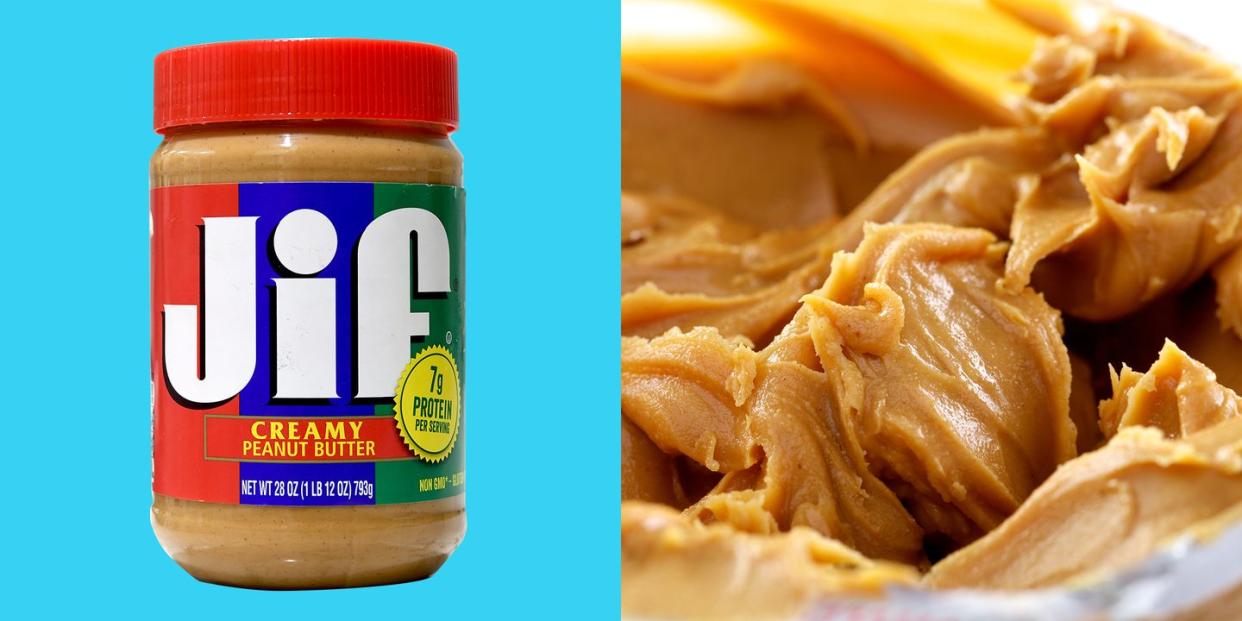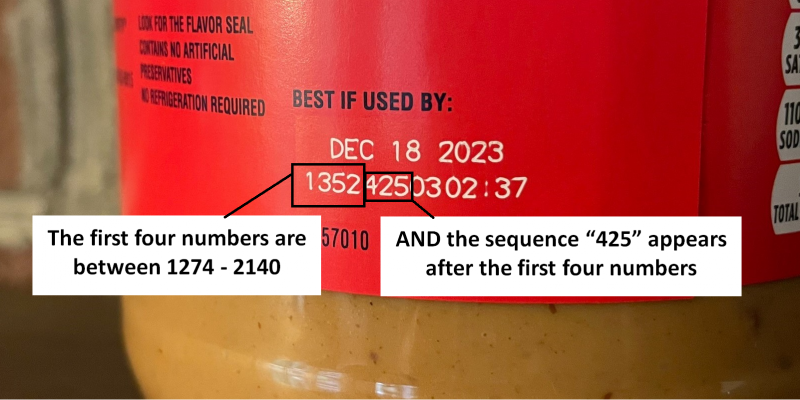Jif Peanut Butter Recalled Several Products Linked To Salmonella—Here’s What You Need To Know

"Hearst Magazines and Yahoo may earn commission or revenue on some items through the links below."
We all know the jar: the one with the bold, striped label synonymous with salty, sweet PB&Js. Jif, the country’s most popular peanut butter brand, is currently subject to a recall due to potential salmonella contamination. So far, 14 people have fallen ill from across 12 states, including two hospitalizations.
For healthy individuals, a salmonella infection is certainly no fun. Salmonella bacteria typically cause fever, diarrhea, nausea, vomiting, and abdominal pain. But it can be far more severe and potentially fatal for young children, the elderly, or those with compromised immune systems.
In a statement to Delish, Jif’s producer, J.M. Smucker Co., described the recall as “voluntary” and in partnership with FDA and CFIA. The outbreak is currently undergoing investigation, but the company says the incident was isolated to its Lexington, Kentucky manufacturing facility and does not impact any of its other peanut-butter-producing facilities.
How do I find out if my Jif peanut butter is recalled?
Dozens of Jif products, from creamy to crunchy peanut butter, are part of the recall. To find out if your spread is one of them, check out this list and look at the lot number on your jar, which can be found near the “best if used by” date.
“Consumers, restaurants, and retailers should not eat, sell, or serve any recalled Jif brand peanut butter that have lot code numbers 1274425 through 2140425, only if the first seven digits end with 425,” according to the FDA.

My Jif product is recalled. What do I do now?
If you’ve used one of the recalled peanut butter products, the FDA recommends washing and sanitizing all surfaces and utensils that may have come into contact with it. Those with symptoms should contact their healthcare provider.
And, yes, you will be reimbursed. “Our number one priority is to deliver safe, quality products to our consumers,” said J.M. Smucker Co. “If consumers have products matching the description of impacted product in their possession, they should visit www.jif.com/contact-us to coordinate their reimbursement and dispose of the product.” Consumers can also call 800-828-9980.
Does this mean there will be a peanut butter shortage?
There’s no need to start hoarding peanut butter for your lunchtime sandwich just yet.
“There are enough other peanut-processing plants out there that are processing under a variety of different labels and brand names, off-brand names,” said Patricia Bowman, an associate professor at Johnson & Wales University’s Food & Beverage Management department. “I don't see that we're going to have a shortage now.”
Food recalls and their ramifications
How might peanut butter be contaminated with salmonella in the first place?
“I would say that just the biggest food safety issue is where employees have been, not on purpose, but cutting corners to make production faster,” explained Bowman. Mistakes like not washing hands often enough or failing to adequately monitor a product’s temperature are major culprits. “What happens then is people do end up getting sick.”
In recall situations, Bowman said consequences can vary. If a product is packaged for consumer retail and hasn’t yet been purchased in large volumes, a recall’s impact could be minimal. However, if that product is packaged in large quantities—say, for a large institution like a school, jail, hospital, or to be used in food production—there could be greater ramifications, even if it hasn’t yet been consumed.
“Let’s say we caught it in time, now I don’t have enough peanut butter for however long until my next shipment comes—what do I do? What menu item can I use to replace it?” she said. “So now you’re looking at [a decreased] quality of service and potentially lost revenue.”
Are food recalls on the rise?
From past reports of E.coli-contaminated beef and metal fragments in Skippy peanut butter to salmonella-laced packaged sushi and frozen shrimp, it may seem like we’re hearing about food recalls more frequently, but Bowman doesn’t think there’s been an increase.
“With mass media, with the amount of speed in which a story will come out, we’re hearing about more of them,” she said. It’s not inherently a bad thing, though—and might even keep more people safe. There’s certainly no need to panic. “They’re not necessarily occurring any more often,” Bowman assured us.
You Might Also Like

